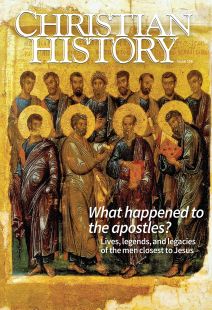Recommended resources: Apostles

Books
For accessible overviews on the lives, legends, and martyrdoms of the apostles, refer to Sean McDowell, The Fate of the Apostles: Examining the Martyrdom Accounts of the Closest Followers of Jesus (2015). McDowell defends the faith by examining how the apostles were impacted so greatly by the life, death, and Resurrection of the Lord Jesus Christ that they were willing to die for their faith. Each of the chapters follows an apostle, including Jesus’s brother, James, as well as Paul and Matthias; presents their stories found in ancient sources; and discusses the credibility that all the apostles (except John) suffered martyrdom.
Also see Bryan Litfin, After Acts: Exploring the Lives and Legends of the Apostles (2015). Among the apostles Litfin explores in this book are also Mark, Luke, and Mary, the mother of Jesus. One unique and helpful feature of Litfin’s book is a report card at the end of each chapter, in which the author grades conclusions by the church fathers and apocryphal acts.
Finally, read W. Brian Shelton, Quest for the Historical Apostles: Tracing Their Lives and Legacies (2018). This elegantly written exploration of the apostles’ lives begins with the biblical accounts and then moves through the early church fathers’ accounts and the apocryphal acts. The author concludes his chapters with discussions of symbolism and imagery connected to the apostles plus their possible burial sites.
On specific apostles you may find Christopher Matthews, Philip: An Apostle and Evangelist (2002) helpful. On Peter read Dennis Buchholz, Your Eyes Will Be Opened: A Study on the Greek (Ethiopic) Apocalypse of Peter (1988). On John refer to Alan Bandy and Alexander Stewart (eds.), The Apocalypse of John Among Its Critics: Questions and Controversies (2023). Study Paul with Alan Bandy, An Illustrated Guide to the Apostle Paul (2021) and Glen Thompson, In This Way We Came to Rome: With Paul on the Appian Way (2024).
Much of what the church knew or understood about the apostles comes from ancient historical accounts of the church, such as the writings of Papias of Hierapolis (95–110); Tertullian, Against Heresies (second century); Hippolytus, On the Apostles and Disciples (third century); Eusebius of Caesarea, Church History (c. 324); Jerome, The Lives of Illustrious Men (c. 392); Pseudo-Hippolytus, Letter of Clement to James (fourth century); Aphrahat, Demonstration XXI: Of Persecution (early fourth century); and Socrates Scholasticus, Ecclesiastical History (fifth century). You may also study the reliability of Scripture with Craig Keener, Miracles Volumes I & II: The Credibility of New Testament Accounts (2011) and The Historical Jesus of the Gospels (2009).
For a look at early church identity and history, read Helen Rhee, Early Christian Literature: Christ and Culture in the Second and Third Centuries (2005); Stefana Dan Laing, Retrieving History: Memory and Identity Formation in the Early Church (2017); and Glen Thompson, Jingjiao: The Earliest Christian Church in China (2024).
Apocryphal acts of the apostles share legends and stories that, though possibly rooted in fact, are questionable as historical sources. Apocryphal texts referenced or quoted in this issue include: Apocalypse of Peter, Acts of Peter, Acts of Peter and Paul, Acts of Philip, Martyrdom of Andrew, Pseudo-Abdias, Acts of the Holy Apostle John, Acts and Martyrdom of Matthew, Acts of Thomas, Acts of Simon and Jude, Acts of Andrew and Matthias, and Acts of Paul.
The best-known medieval hagiography of the apostles is Jacobus de Voragine, The Golden Legend: Readings of the Saints (c. 1260). For more on their medieval veneration, see Peter Brown, The Medieval Cult of Saints: Its Rise and Function in Western Christianity (1982).
PAST CH ISSUES
These past issues of Christian History share content relevant to this issue—all are available online; some are available for purchase as hard copies.
17 – Women in the Early Church
27 – Persecution in the Early Church
37 – Worship in the Early Church
43 – How We Got Our Bible
47 – Paul and His Times
51 – Heresy in the Early Church
59 – The Life and Times of Jesus of Nazareth
96 – The Gnostics
105 – Christianity in Early Africa
124 – Faith in the City
144 – Christian History in Images
147 – Everyday Life in the Early Church
VIDEOS FROM VISION VIDEO
Vision Video carries a number of films about the apostles, the early church, and the ancient world, including Barnabas and Paul, The Trial and Testimony of the Early Church, Exploring Ephesus: City of Apostles, Lives of the Apostles Paul and Peter, Story of the Twelve Apostles, Paul the Apostle, The Apocalypse, The Week that Changed the World, Paul’s Road to Damascus, Ancient Bible Destinations of Greece, In the Footsteps of St. Peter, The Seven Churches of Revelation Rediscovered, and Fragments of Truth. You may also find the animated films The Messengers and To Every Nation helpful for children. Some of these titles are only available via digital download; you may access more content by streaming on Redeem TV.
WEBSITES
Public-domain primary source documents mentioned in this issue can be found in the usual collections—most useful are the Internet Ancient History Sourcebook, Christian Classics Ethereal Library, and Project Gutenberg.
Specifically, writings by Tertullian can be found at the Tertullian Project. The Internet Medieval Sourcebook on Saints’ Lives shares hagiographical accounts of the apostles and apostolic-age saints. You can also find a fairly complete list of all New Testament apocryphal texts at Comparative-Religion.com. CH
By the editors
[Christian History originally published this article in Christian History Issue #156 in 2025]
Next articles
Fast and Feasts: A note from the author
Christian faith is a story rooted in time and amenable to representation in a calendar
Jennifer Woodruff TaitJewish fasts and feasts
Christian fasts and feasts developed against the background of Jewish practices
Jennifer Woodruff TaitAwaiting his coming
Advent preparation spans the four Sundays before Christmas
Jennifer Woodruff Tait







